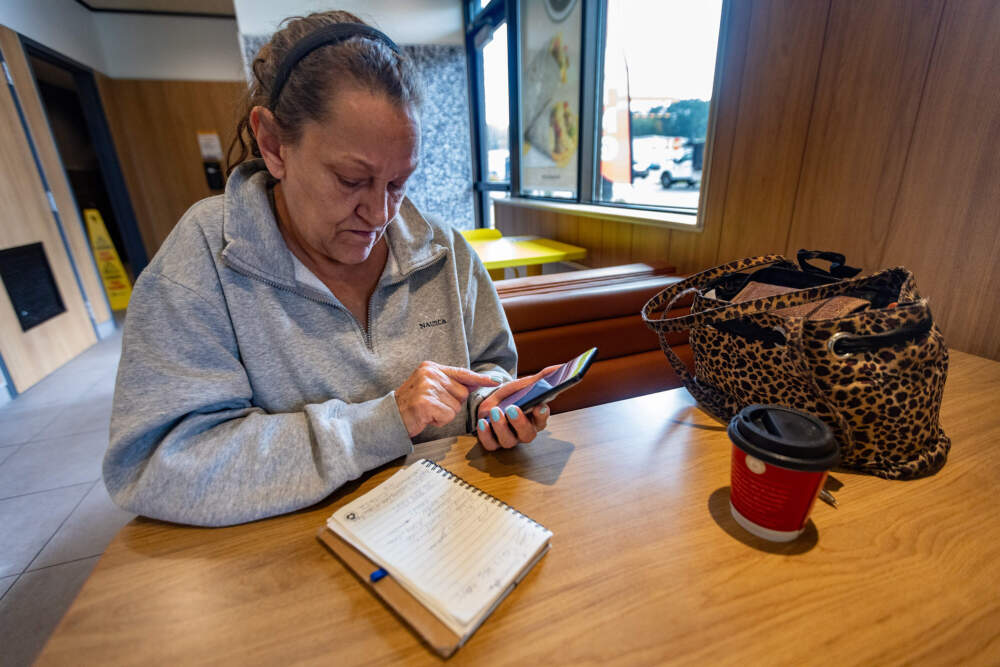Advertisement
As shelters expand into hotel and motel rooms, some end up displaced
Resume
Brenda Banville has been sleeping in a McDonald’s parking lot about an hour from Boston. At 61, she’s living out of a car with her adult son.
The backseat of the weathered blue car is filled with important papers, a box fan and a few blankets. Usually there’s some food, but recently, they ran out. At night, they recline the cramped sedan’s front seats.
“I sleep on the side with my coat for a pillow,” Banville said.
A little over a year ago, Banville and her son lost their apartment. They got a room at a faded pink roadside motel in the same Massachusetts town where she’s lived for 39 years. Then, Banville says, the cost of the room went up — and they couldn’t afford to stay anywhere besides her son’s car.
Soon after leaving, Banville and her son learned nearly all of the motel rooms were being used for the state’s family shelter system.
The number of parents and children in the system has grown at such a record-breaking pace that Massachusetts has run out of shelter units. To fill the gap, the state has rented thousands of hotel and motel rooms. Now, more than 3,700 homeless families live in those rented rooms. And in a first, the state has ended its guarantee to house families that qualify for the shelter system, instead placing them on a waitlist.
Experts say the use of hotels and motels as shelters has disrupted some markets and sent prices up. Some of the rate hikes are because hotel owners are capitalizing on the state’s desperate need for rooms. Other price increases are because the overall supply of rooms has dropped in certain areas.
While state officials and shelter providers work to avoid displacing longtime motel residents, like Banville, housing advocates say they are aware of cases where people have been pushed into homelessness.
A motel-turned-shelter
When Banville started staying at the motel, she remembers feeling lucky to find an understanding owner. The room she and her son shared cost between $75 and $90 a night, depending on the season, but sometimes the Banvilles couldn’t pay in full.
“If [my son] didn't have 20 more dollars, they would let him owe him until the next day, because some days he makes more money than other days,” Banville explained.
Her son, Steven, delivers food for the app DoorDash. He was making enough money to scrape by, but in September, motel management said the rent was going up — and they’d have to pay weekly rather than nightly.
“We didn't have it,” Banville said. “So we had to leave.”
The motel owner declined interview requests, but shelter staff confirms they are paying a nightly rate of $120 per room, or $840 a week. WBUR is not including the name of the motel or the town, because family shelter sites have been targeted by hate groups.
Housing advocates say it’s unclear how many hotel-turned-shelter rooms formerly provided long-term housing for other people.
“The data piece is hard,” said Rachel Heller, CEO of Citizens’ Housing and Planning Association. “If someone's not connected to any particular program or service, how would we know that this is happening?”
However, housing advocates and other experts say they've heard of people being pushed out of hotels and motels.
“It's happening enough that it's clear it's a problem,” Heller said.
"We're there to help people that are homeless. Our mission is never to put anybody in a position where they're going to become homeless."
Colby O'Brien
Converting hotels into homeless shelters is a decades old idea, but it became widespread during the pandemic lockdowns. “A lot of hotel rooms were empty during the early COVID times, so that worked out really well,” explained Steve Berg, the chief policy officer at the National Alliance to End Homelessness.
Now, in places from Maine to California, this strategy is still in use. But the dynamics have become more complicated, with lots of jockeying for limited space.
“The problem is there’s not enough housing for everyone,” Berg said. “So whoever gets it, is at the expense of someone else who doesn’t get it and has to go live someplace worse.”
Berg says this challenge is particularly acute in parts of the country where migrant populations are spiking.
“If you suddenly add a whole bunch of new people that's going to mean somebody's got to make decisions about who isn't going to get the help,” he said.
In Massachusetts, roughly half the parents and children in the shelter system are new immigrants. Gov. Healey has begged for federal help, including funding and expedited work permits.
Over the summer, Healey announced a state of emergency, and her administration has expanded rental support programs, opened new welcome centers and deployed the National Guard to coordinate resources at unstaffed hotel and motel shelters. The governor established a maximum population for the shelter system and paved the way to limit the length of time families can stay in shelter.
In a fact sheet provided by the Healey administration to legislators in September, state officials wrote that, “the Administration works to ensure that no person or family currently living in a hotel or motel is displaced as a result of our efforts to shelter families in need.”
One challenge, according to a spokesperson for the Executive Office of Housing and Livable Communities (EOHLC), is hotel and motel owners manage their own reservations.
“It's not much different than if you were booking for a wedding, or if you were a business booking a bunch of rooms for a convention," said Noah Bombard, director of communications for EOHLC, the state agency overseeing the family shelter system. "The hotel tells us, ‘We have 20 rooms, 30 rooms — whatever's available.’ And the state says, ‘We'll take them.’ "
Bombard says if a resident were displaced, the state would look for alternative arrangements.
“Each situation would probably be unique if that were to happen,” he said. “And we'd have to analyze what was in front of us.”
‘Let’s keep them living at the hotel’
Colby O’Brien, the senior director of programs and integration for the shelter provider Making Opportunity Count, helps run five hotel and motel locations for the state. When opening a new shelter site, he says one of the first things his team does is meet with the hotel owner.
“And we say, ‘Hey, who do you have living there right now? Are there long-term guests?’ ” O’Brien said.
The thinking behind those questions is simple. “We're there to help people that are homeless," O'Brien said. "Our mission is never to put anybody in a position where they're going to become homeless.”
But the details can be tricky. Several weeks ago, his team started working at a motel where about a dozen families were already living. They looked for new places for the families to live. Some relocated to a hotel down the road with similar prices. One was in the process of renting a house.
“And then there was a family at this site that was in the school district. The child actually had autism,” O’Brien said. “And we said, ‘Let's not uproot them. Let's keep them living at the hotel.’ ”
At another site, O’Brien learned the owner was going to nearly double the rate for a family that had lived there a long time, from $600 to $1,000 a week. O’Brien says he immediately called the owner.
“We had a discussion around why it's not fair to them,” O’Brien said. "Just because you can maximize revenue doesn't mean that you should put people in a situation where they can't afford to live anymore.”
That family was allowed to keep the original rate.
Michael White, director of operations for DLP Hospitality, which owns the Clarion Hotel in West Springfield, says the entrance of the shelter system into the hotel market has significantly changed the dynamics.
Some hotels and motels, he says, have upped prices in response to the state’s sudden surge in demand for shelter units.
“One hotel in particular, normally their rates were like $79 or $89, and they were charging [the state] $199,” White said. “We were appalled.”
His hotel, which has been converted into shelter space, charges the state about 40% below market rate because, White says, his team can now guarantee 100% occupancy for an entire year, which would have previously been unimaginable. The consistent income allows the hotel to charge less, while hiring more staff.
However, White acknowledges that becoming a shelter has driven up prices at other nearby hotels and motels. He says there’s still the same demand for hotel rooms from people outside the shelter system, but his 260 rooms are suddenly offline. So, there’s more competition for the remaining rooms.
“We've seen hotels charging $200 to $300 a night on the weekends. Weekdays, they've been in the $170s,” White said, noting that in the past those rates were between $159 and $199 on weekends and between $99 and $129 on weekdays.
White’s hotel didn’t have any long-term occupants because of local regulations that prohibit guests from staying more than 30 days, he says.
Heller, of Citizens’ Housing and Planning Association, worries about the people who used to live in hotels and motels — and now find themselves without even that option.
She says the state may need to institute a policy that avoids displacing people. Or the state could limit how many rooms it rents in a single hotel or motel, leaving other units for longtime occupants.
O’Brien, from the shelter provider Making Opportunity Count, says he worries about the longtime guests he doesn’t hear about. “What I don't know, I can't help,” he said.
His team works at the motel where Banville used to live. He says he was never told about her situation.
From the McDonald’s parking lot, Banville says she’s not willing to go to an adult shelter, partly because she’d be separated from her son.
“I won't go," she said. "I just — I can't."
Some nights she and her son find enough money for a nearby motel, but she says the rooms are more expensive than where they used to stay. The town has helped them pay for a room for a few nights, and sometimes she gets food through a town program. But, she says, securing their daily needs has been hard.
Sitting by their parked car, Banville says she understands the need to expand the family shelter system and help people fleeing difficult situations in other countries.
But she wishes the system wasn’t trading one person’s shelter for another's.
“They came here to be safe, so we're trying to help them," she said. "But I need help.”
This article was originally published on October 16, 2023.
This segment aired on October 16, 2023.
